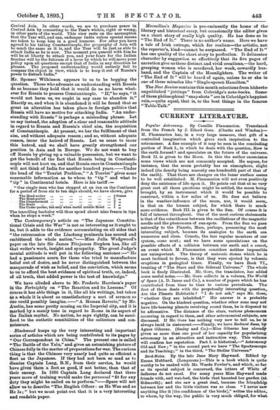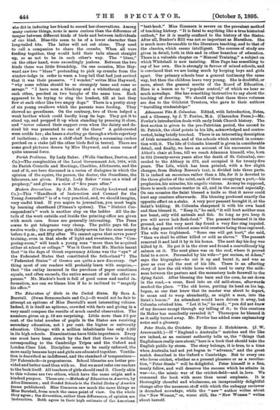Bird-Notes. By the late Jane Mary Hayward. Edited by Emma
Hubbard. (Longmans.)—This is a book which is quite worthy to be ranked with Mr. Warde Fowler's, and which, so far- as its special subject is concerned, the letters of White of Selborne do not excel. For many years Miss Hayward made. friends with, and watched, the birds that haunted her garden (at Sidmouth) ; and she saw a great deal, because the friendship. between her and the little visitors was so close. "I never saw- anything like it [the confidence of the birds]," writes the editor,. to whom, by the way, the public is very much obliged, for what.
albs did in inducing her friend to record her observations. Among many curious things, none is more curious than the difference of temper between different kinds of birds and between individuals of one kind. Blue-tits seem to be of a lower character than long-tailed tits. The latter will not eat alone. They used to call a companion to share the crumbs. When all were feeding together, they would hold their tails almost straight up, so as not to be in each other's way. The "blues," on the other hand, were exceedingly jealous. Between the two kinds there was little friendship. On one occasion, Miss Hay- ward saw two " blues " pretending to pick up crumbs from the window-ledge in order to warn a long-tail that had just arrived that it was their preserve. "I wonder," writes Miss Hayward, "why some robins should be so strangely tame and some so savage." "I have seen a blackcap and a whitethroat sing at each other, perched on two boughs of the same tree. Each appeared to be trying to sing the loudest, till at last they flew at each other like two angry dogs." There is a pretty story of six young swallows which the parents were feeding. They showed no greediness. On the contrary, two of them helped a weak brother which could hardly keep its legs. They got it to stand up, and propped it up when standing by pressing it close, and "never relaxed their support even when the dainty and de- sired bit was presented to one of the three." A gold-crested wren scolds her; she hears a starling go through a whole repertory of imitations ; she sees a chiff-chaff feeding a screaming cuckoo perched on a stake (all the other birds fled in terror). There are some good pictures drawn by Miss Hayward, and some verse of quite unusual force.







































 Previous page
Previous page